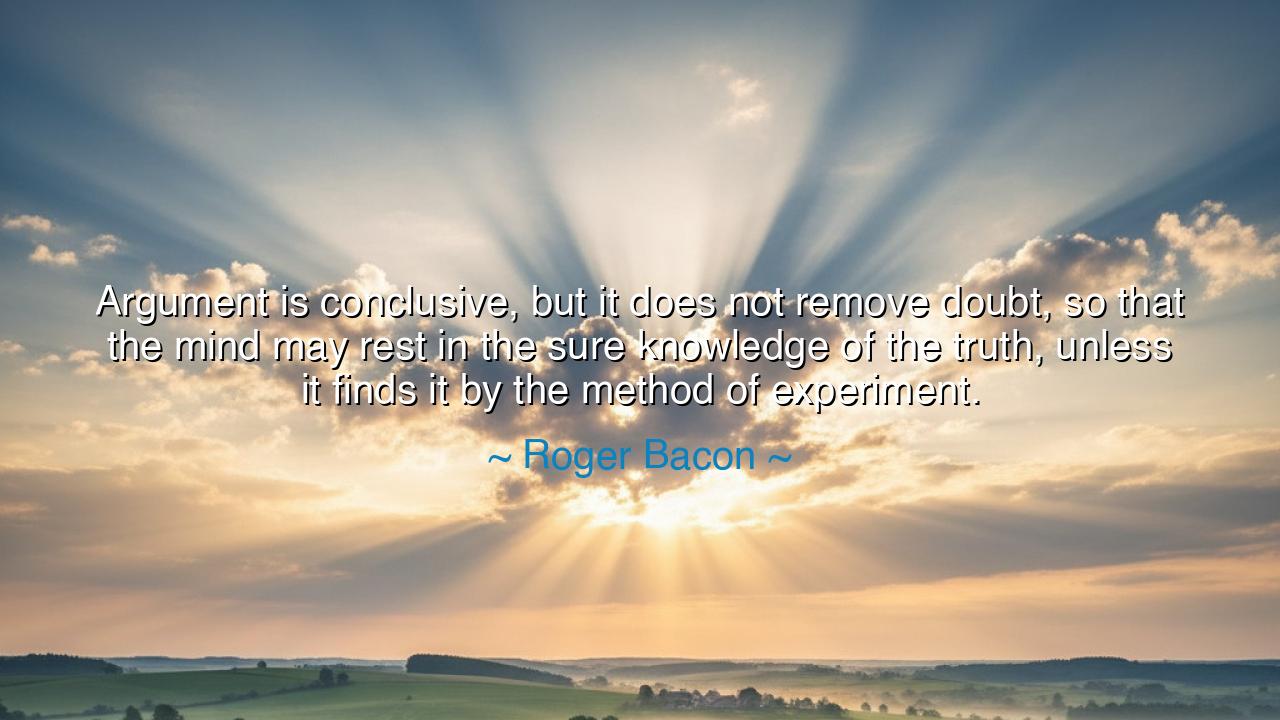
Argument is conclusive, but it does not remove doubt, so that the
Argument is conclusive, but it does not remove doubt, so that the mind may rest in the sure knowledge of the truth, unless it finds it by the method of experiment.






Roger Bacon, the thirteenth-century friar and seeker of truth, declared with prophetic clarity: “Argument is conclusive, but it does not remove doubt, so that the mind may rest in the sure knowledge of the truth, unless it finds it by the method of experiment.” In these words, he set a torch to the dark corridors of ignorance and superstition, showing that debate alone, however clever, cannot satisfy the soul’s hunger for certainty. Argument may sharpen the mind, but only experiment can anchor it in reality.
The ancients knew the power of speech. Rhetoric swayed the assemblies of Athens, and debate filled the halls of Rome. Yet too often, the triumph of words was mistaken for the triumph of truth. One could argue endlessly whether the Earth stood still or the heavens moved, whether disease was born of spirits or humors, whether gold could be made from lead. Arguments multiplied, but certainty remained elusive. Bacon, with eyes lifted above the traditions of his age, declared that only by testing—by trial, by experiment—could humanity lay hold of knowledge firm enough to endure.
Consider the tale of Galileo, centuries after Bacon’s words. Learned men argued in councils that the Earth was the center of the cosmos. Their arguments were intricate, their scriptures quoted, their logic sharp. Yet Galileo took a telescope and experimented—he gazed upon the moons of Jupiter circling their master, and he knew the old system must fall. No argument could refute the sight of those wandering lights. Here Bacon’s wisdom was vindicated: words alone could not move the mind to certainty, but the eye confirmed by experiment could silence doubt.
Bacon’s teaching was dangerous in his day. To challenge argument with experiment was to challenge authority itself, for many in his time believed truth was safeguarded by tradition and holy decree. Yet Bacon insisted that the book of nature, written by the hand of God, must also be read—and that it is through experiment, not endless debate, that its letters can be understood. Thus, he became a forerunner of the scientific method, planting seeds that would one day flower in the Enlightenment.
The meaning of this quote, then, is twofold. First, it is a warning against complacency: do not mistake eloquence for truth, nor victory in argument for certainty. Second, it is a call to action: to seek truth with hands and eyes, to test, to question, to prove. For only then can the mind rest secure, freed from the restless shadow of doubt.
The lesson for us is eternal. In our age, as in Bacon’s, voices argue endlessly—in courts, in parliaments, in the streets, and now upon the glowing screens of our devices. But no matter how polished the argument, truth must still be tested. Do not accept claims without evidence. Do not mistake the loudest voice for the truest. Instead, demand the trial of reality, the proof of experiment, the verification that silences doubt and grants peace to the seeking mind.
So what must we do? In daily life, be as Bacon taught: when told a thing, seek its proof. Test your own ideas, refine them by experience, and let failure be your teacher. In your work, whether of science, art, or craft, value practice over speculation, evidence over hearsay. Teach your children not merely to argue, but to observe, to test, to learn with their own hands. For in this way, we build not castles of words that crumble, but foundations of truth that endure.
Remember the words of Roger Bacon: “Argument is conclusive, but it does not remove doubt … unless it finds it by the method of experiment.” Carry them as armor against deception, as a compass toward truth. For the world is full of voices, but certainty belongs only to those who dare to test, to seek, and to find.






AAdministratorAdministrator
Welcome, honored guests. Please leave a comment, we will respond soon